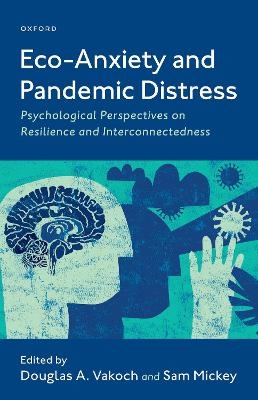
Eco-Anxiety and Pandemic Distress
Oxford University Press Inc (Verlag)
978-0-19-762267-4 (ISBN)
Eco-Anxiety and Pandemic Distress both builds upon and moves beyond the latest research in environmental psychology, conservation psychology, and clinical psychology. Dominant research paradigms in these areas rely primarily on experimental and observational methodologies that analyze quantitative data. In contrast, this book focuses on sophisticated traditions of social and cultural psychology in dialogue with other disciplines in the social sciences and humanities. The result is a nuanced understanding of the human experience of confronting eco-anxiety, offering critical insights into the subjective worlds of individuals as they grapple with the intertwined existential threats of the climate crisis and pandemics.
Douglas A. Vakoch is an American astrobiologist, search for extraterrestrial intelligence (SETI) researcher, psychologist, and president of METI International, a nonprofit research and educational organization devoted to transmitting intentional signals to extraterrestrial civilizations. He has edited over a dozen books in SETI, astrobiology, the psychology of space exploration, and ecocriticism. He is general editor of two book series in ecocriticism and in the intersection of space and society. Vakoch has appeared widely on television and radio as a commentator on SETI and astrobiology. He is an emeritus professor of clinical psychology at the California Institute of Integral Studies (CIIS). Sam Mickey is an adjunct professor in the Theology and Religious Studies department and the Environmental Studies program at the University of San Francisco. He is the Book Review Editor for the journal Worldviews: Global Religions, Culture, and Ecology, a Research Associate for the Yale Forum on Religion and Ecology, and an author of several books exploring intersections of philosophy, religion, and ecology, including On the Verge of a Planetary Civilization: A Philosophy of Integral Ecology (2014), and Coexistentialism and the Unbearable Intimacy of Ecological Emergency (Lexington Books, 2016).
Introduction: Eco-Anxiety, Climate Change, and the Coronavirus
Panu Pihkala
Part 1. Cultivating Connection and Resilience
Chapter 1. Cultivating Belonging: Healing Defensive Anxiety in Times of Collective Trauma
Jan Edl Stein
Chapter 2. From Eco-Anxiety to Eco-Resilience: Toward a Psychology of Care
Linda Buzzell and Craig Chalquist
Chapter 3. Walking, Wilderness, and Exposure: Learning from Thoreau's Episode on Katahdin
Christopher C. Kirby
Chapter 4. Self-Quarantine: Deepening Natural Encounter During COVID-19
Elektra Mercutio
Chapter 5. Setting Up for Practice with Eco-Conscious Clients
Jamie Keaton Jones
Part 2. Sociology and Cultural Psychology
Chapter 6. Eco-Anxiety as a Global Affect
Jaouad Achtitah and Said Mentak
Chapter 7. Eco-Anxiety in a Risk Society: A Sociological Perspective
Leonard A. Steverson
Chapter 8. The Complex Role of Anxiety in Public Engagement: Lessons from the COVID-19 Crisis for Climate Communications
Rhéa Rocque, Laura Cameron, and Ian Mauro
Chapter 9. Behavior Change During COVID-19: A Matter of Life and Death?
Filia Garivaldis and Muhammad Iqbal
Part 3. Diverse Global Responses
Chapter 10. The House of Man: Sheltering in the Anthropocene
Susan Haris and Bharati Puri
Chapter 11. Adapting to Eco-Anxiety: Experiences from Zambia
Fred Moonga
Chapter 12. Psychiatric Ward Lockdown in Latin America: Experiences from the Coronavirus Pandemic
Juan Evangelista Tercero Gaitán Buitrago
Chapter 13. Telepsychology as the Primary Mental Health Care Response to the COVID-19 Pandemic in the Philippines
Emmanuel Villoria Hernani
Chapter 14. Sounding the Environmental Benefits of the COVID-19 Pandemic in Southern Nigeria
Olusegun Stephen Titus
| Erscheinungsdatum | 27.10.2022 |
|---|---|
| Verlagsort | New York |
| Sprache | englisch |
| Maße | 237 x 163 mm |
| Gewicht | 426 g |
| Themenwelt | Geisteswissenschaften ► Psychologie ► Sozialpsychologie |
| Naturwissenschaften ► Biologie ► Ökologie / Naturschutz | |
| ISBN-10 | 0-19-762267-4 / 0197622674 |
| ISBN-13 | 978-0-19-762267-4 / 9780197622674 |
| Zustand | Neuware |
| Informationen gemäß Produktsicherheitsverordnung (GPSR) | |
| Haben Sie eine Frage zum Produkt? |
aus dem Bereich


